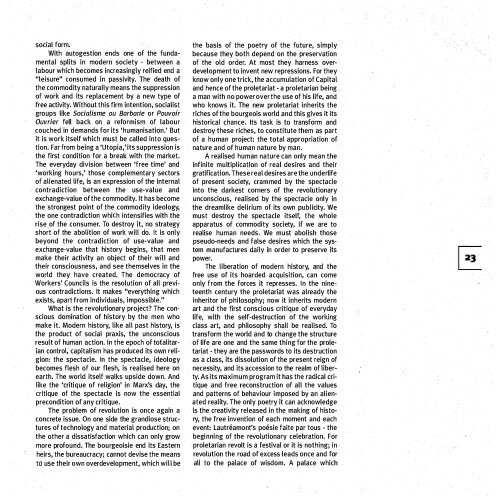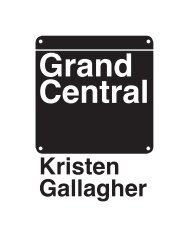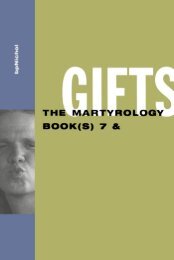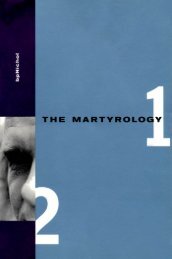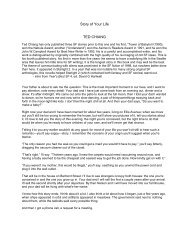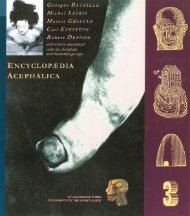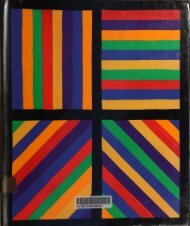SITUATIONISTS AND THE 1£CH MAY 1968
umMYFs
umMYFs
You also want an ePaper? Increase the reach of your titles
YUMPU automatically turns print PDFs into web optimized ePapers that Google loves.
social form.<br />
With autogestion ends one of the fundamental<br />
splits in modern society - between a<br />
labour which becomes increasingly reified end a<br />
"leisure" consumed in passivity. The death of<br />
the commodity naturally means the suppression<br />
of work and its replacement by a new type of<br />
free activity. Without this firm intention, socialist<br />
groups like Socialisme ou Barbarie or Pouvoir<br />
Ouvrier fell back on a reformism of labour<br />
couched in demands for its 'humanisation.' But<br />
it is work itself which must be called into question.<br />
Far from being a 'Utopia,' its suppression is<br />
the first condition for a break with the market.<br />
The everyday division between 'free time' and<br />
'working hours,' those complementary sectors<br />
of alienated life, is an expression of the internal<br />
contradiction between the use-value and<br />
exchange-value of the commodity. it has become<br />
the strongest point of the commodity ideology,<br />
the one contradiction which intensifies with the<br />
rise of the consumer. To destroy it, no strategy<br />
short of the abolition of work will do. lt is only<br />
beyond the contradiction of use-value and<br />
exchange-value that history begins, that men<br />
make their activity an object of their will and<br />
their consciousness, and see themselves in the<br />
world they have created. The democracy of<br />
Workers' Councils is the resolution of all previous<br />
contradictions. lt makes "everything which<br />
exists, apart from individuals, impossible.''<br />
What is the revolutionary project? The conscious<br />
domination of history by the men who<br />
make it. Modern history, like all past history, is<br />
the product of social praxis, the unconscious<br />
result of human action. In the epoch of totalitarian<br />
control, capitalism has produced its own religion:<br />
the spectacle. In the spectacle, ideology<br />
becomes flesh of our flesh, is realised here on<br />
earth. The world itself walks upside down. And<br />
like the 'critique of religion' in Marx's day, the<br />
critique of the spectacle is now the essential<br />
precondition of any critique.<br />
The problem of revolution is once again a<br />
concrete issue. On one side the grandiose structures<br />
of technology and material production; on<br />
the other a dissatisfaction which can only grow<br />
more profo u nd. The bourgeoisie end its Eastern<br />
heirs, the bureaucracy; cannot devise the means<br />
to use their own overdevelopment, which will be<br />
the basis of the poetry of the future, simply<br />
because they both depend on the preservation<br />
of the old order. At most they harness overdevelopment<br />
to invent new repressions. For they<br />
know only one trick, the accumulation of Capital<br />
and hence of the proletariat - a proletarian being<br />
a man with no power over the use of his life, and<br />
who knows it. The new proletariat inherits the<br />
riches of the bourgeois world and this gives it its<br />
historical chance. Its task is to transform and<br />
destroy these riches, to constitute them as part<br />
of a human project: the total appropriation of<br />
nature and of human nature by man.<br />
A realised human nature can only mean the<br />
infinite multiplication of real desires and their<br />
gratification. These real desires are the underlife<br />
of present society, crammed by the spectacle<br />
into the darkest corners of the revolutionary<br />
unconscious, realised by the spectacle only in<br />
the dreamlike delirium of its own publicity. We<br />
must destroy the spectacle itself, the whole<br />
apparatus of commodity society, if we are to<br />
realise human needs. We must abolish those<br />
pseudo-needs and false desires which the system<br />
manufactures daily in order to preserve its<br />
power.<br />
The liberation of modern history, and the<br />
free use of its hoarded acquisition, can come<br />
only from the forces it represses. In the nineteenth<br />
century the proletariat was already the<br />
inheritor of philosophy; now it inherits modern<br />
art and the first conscious critique of everyday<br />
life, with the self-destruction of the working<br />
class art, and philosophy shall be realised. To<br />
transform the world and to change the structure<br />
of life are one and the same thing for the proletariat<br />
- they are the passwords to its destruction<br />
as a class, its dissolution of the present reign of<br />
necessity, and its accession to the realm of liberty.<br />
As its maximum program it has the radical critique<br />
and free reconstruction of all the values<br />
and patterns of behaviour imposed by an alienated<br />
reality. The only poetry it can acknowledge<br />
is the creativity released in the making of history,<br />
the free invention of each moment and each<br />
event: Lautreamont's poesie faite par tous - the<br />
beginning of the revolutionary celebration. For<br />
proletarian revolt is a festival or it is nothing; in<br />
revolution the road of excess leads once and for<br />
all to the palace of wisdom. A palace which


